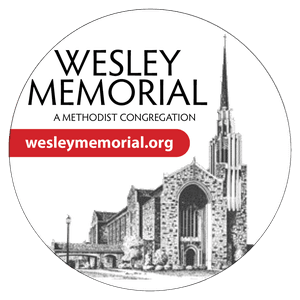A STATEMENT OF FAITH
Wesley Memorial Methodist Church is an autonomous, evangelical church in the Anglican/Methodist tradition. In the spirit of John Wesley, we seek to be a source of spiritual awakening and growth for Christians across the denominational spectrum. While rooted in the orthodox faith that flows from the Holy Scriptures, especially as expressed in the 18th century Methodist revival, we endeavor to help people live as fully devoted disciples in the 21st century. We seek to live out our faith as a congregation through worship, prayer, small groups, hands-on mission, and invitation to others to receive the fulness of life that is available in Jesus Christ.
For sixty years, Wesley Memorial Church’s statement of faith have been the doctrinal standards as found in the Book of Discipline of the United Methodist Church and before that in the Book of Discipline of the Methodist Church.
I. STATEMENT ON HOLY SCRIPTURE
The canonical books of the Old and New Testaments (as specified in the Methodist Articles of Religion) are the inspired Word of God, infallible regarding faith and practice, our primary rule and authority for Christian thought and life, against which all other authorities must be measured.
II. FOUNDATIONAL CREEDS OF CHRISTIANITY
The following summaries of the apostolic witness disclosed in Scripture have been affirmed by Christians throughout history, and express traditional Christian teaching and Wesley Memorial Church’s understanding of the Christian faith.
THE APOSTLES’ CREED (A.D. 250)
I believe in God, the Father Almighty, Maker of Heaven and Earth; And in Jesus Christ his only Son, our Lord; Who was conceived by the Holy Spirit, Born of the Virgin Mary, suffered under Pontius Pilate, Was crucified, dead and buried; The third day he rose from the dead; He ascended into Heaven, And sitteth at the right hand of God the Father Almighty; From thence He shall come to judge the quick and the dead. I believe in the Holy Spirit, The holy catholic* church, The communion of saints, The forgiveness of sins, The resurrection of the body, And the life everlasting. Amen.
*universal
THE NICENE CREED ( A.D. 381)
We believe in one God, the Father, the Almighty, Maker of heaven and earth, of all that is, seen and unseen.
We believe in one Lord, Jesus Christ, the only Son of God, eternally begotten of the Father, God from God, Light from Light, true God from true God, begotten, not made, of one Being with the Father; through Him all things were made. For us and for our salvation He came down from heaven, was incarnate of the Holy Spirit and the Virgin Mary and became truly human. For our sake He was crucified under Pontius Pilate; He suffered death and was buried. On the third day He rose again in accordance with the Scriptures; He ascended into heaven and is seated at the right hand of the Father. He will come again in glory to judge the living and the dead, and His kingdom will have no end.
We believe in the Holy Spirit, the Lord, the giver of life, who proceeds from the Father and the Son, who with the Father and the Son is worshiped and glorified, who has spoken through the prophets. We believe in one holy catholic* and apostolic church. We acknowledge one baptism for the forgiveness of sins. We look for the resurrection of the dead, and the life of the world to come. Amen.
*universal
A fuller expression of traditional Methodist theology can be found in the Thirty-Nine Articles, especially John Wesley’s abridgement for the American Methodists.
III. WESLEYAN WAY OF SALVATION
Humanity is fallen from righteousness and, apart from the grace of the Lord Jesus Christ, is destitute of holiness and inclined to evil. (Gen. 6:5; Ps. 51:5; Eccl. 9:3; Jer. 17:9-10; Rom. 3:23; 5:12-14; Eph. 2:1-3; 1 Jn. 1:8)
The gift of grace is available to all people. Our Father in Heaven is not willing that any should be lost, but that all may come to know him and live always in fellowship with him. With St. Paul, thus, we affirm the proclamation found in Romans 10:9, “That if you confess with your mouth, 'Jesus is Lord,' and believe in your heart that God raised Him from the dead, you will be saved.” Grace is the manifestation of God’s love toward fallen creatures. Grace is God’s empowering presence at work in the life of the Christian to be freely received and freely given. This undeserved gift works to liberate humanity from both the guilt and power of sin and live as children of God, freed for joyful obedience. In the classic Wesleyan expression, God's grace works in numerous ways throughout our lives, beginning with the general providence of God toward all. (Matt. 18:14; 1 Tim. 2:3,4; Heb. 2:9; 1 Jn. 2:2; Tit. 2:11; Jn. 3:16; Jn. 1:9; 2 Cor. 5:14; 2 Pet. 3:9)
God’s prevenient grace refers to “the first dawning of grace in the soul,” the grace humans receive from conception to conversion, mitigating the effects of original sin, even before we are aware of our need for God. It prevents the full consequences of humanity’s alienation from God and awakens conscience, giving an initial sense of God and the first inclinations toward life. Received prior to our ability to respond, prevenient grace enables genuine response to the continuing work of God’s grace. (Matt. 5:45; Lk. 15:20; 24:45 Jn. 6: 37; 44; 15:5; 16:8-11; Acts 2:37; 8:31; 15:8; 16:30; 2 Pet. 3:9; Tit. 2:11-12; 1 Cor. 2:14)
God’s convincing grace leads us to what the Bible terms “repentance,” awakening in us a desire to “flee the wrath to come” and enabling us to begin to “fear God and work righteousness.” (Hos. 6:1; Mic. 4:1-2; Hab: 2:4; Zech. 8:20-23; Matt.3:7; Jn. 16:8; Acts 10:35; Eph. 2:4-5; 2 Cor. 7:9-10; Heb. 13:18)
God’s justifying grace works by faith to bring reconciliation to God through the atoning sacrifice of Jesus Christ, what God does for us. It is pardon for sin and ordinarily results in assurance, “God’s Spirit witnessing with our spirit that we are children of God.” (Isa. 53:4-6; Jn. 3:16; Rom. 5:10-11; 2 Cor. 5:18-19; Eph. 2:13-16; Heb. 2:17)
God’s sanctifying grace begins with God’s work of regeneration, sometimes referred to as “being born again.” It is God’s work in us as we continually turn to Him and seek to be perfected in His love. Sanctification is the process by which the Holy Spirit works to replace sin with the fruit of the Spirit. With John Wesley, we believe that a life of holiness or “entire sanctification” should be the goal of Christian’s journey with God. (Ps. 51:2, 7-12; Jer. 31:31-34; Ezek. 36:25-27; Gal. 5:16-25; Tit. 2:11-14; 1 Jn. 7, 9; 1 Thess. 5:23-24)
Our ultimate hope and promise in Christ is glorification, where our souls and bodies are perfectly restored in the Kingdom of God. (Isa. 26:19; Dan. 12:2-4; Jn. 11:25-26; Rom. 6:5; 8:22-23; 1 Cor. 15:35-56; Phil. 3:20-21; Rev. 21:1-5)
For Further Study: The Thirty-Nine Articles of the Church of England, 1571; The Methodist Articles of Religion, 1784.


